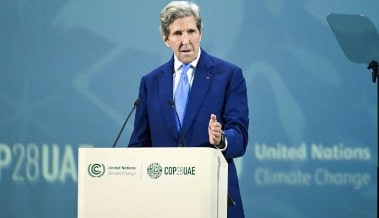John Kerry, special presidential envoy on climate matters, announced Saturday that the United States has “proudly” committed to not to build any new coal plants and to get rid of existing ones entirely.
“To meet our goal of 100 percent carbon pollution-free electricity by 2035, we need to phase out unabated coal,” Mr. Kerry said in a Dec. 2 statement, in which he announced that the United States had officially joined a coalition of 56 other countries who all plan to ditch coal in the name of climate change.
“We will be working to accelerate unabated coal phase-out across the world, building stronger economies and more resilient communities,” Mr. Kerry said in his statement.
“The first step is to stop making the problem worse: stop building new unabated coal power plants.”
While no specific date was given for when the Biden administration plans to nix America’s existing coal plants, other regulatory actions by the administration zero in on 2035 as the year when coal ends.
Just under 20 percent of U.S. electricity was powered by coal as of October 2023, according to the Department of Energy (DOE).
Anti-Coal Alliance
The anti-coal pact that Mr. Kerry said Washington had just joined is called the Power Past Coal Alliance, which was started six years ago and had 50 members until Saturday, when the United States, Czech Republic, Cyprus, Dominican Republic, Iceland, Kosovo, and Norway joined bringing the total to 56.
Citing IEA’s Net Zero Roadmap, the Power Past Coal Alliance said in a Dec. 2 statement that, in order to “keep the 1.5°C goal within reach,” advanced economies like the United States need to immediately end the construction of new coal power plants and phase out existing plants by 2030, and by 2040 in the rest of the world.
The 1.5°C threshold, first established in the Paris Agreement in 2015, aims to limit the global temperature rise to 1.5°C by 2100.
In 2022, coal-fired plants generated 36 percent of global electricity, outstripping all other sources. Over half of this output was in China, which is building new coal plants at a fast pace, undeterred by various climate pledges and goals that the country’s leadership has paid lip service to.
The next three largest contributors to global coal-fired electricity are India, the United States, and Japan, which jointly account for around 25 percent of the total.
Coal Use In China, Elsewhere
China saw coal power projects jump in 2022 despite the country’s pledge to cut down coal consumption by the end of the decade.
In 2022, coal power construction starts, new project announcements, and plant permissions “accelerated dramatically” in China, according to a February report (pdf) by Global Energy Monitor and the Centre for Research on Energy and Clean Air (CREA), which noted that roughly two new coal power plants were being permitted per week in China.
“50 GW of coal power capacity started construction in China in 2022, a more than 50 percent increase from 2021. Many of these projects had their permits fast-tracked and moved to construction in a matter of months,” the report said.
“A total of 106 GW of new coal power projects were permitted, the equivalent of two large coal power plants per week,” the report continued.
“The amount of capacity permitted more than quadrupled from 23 GW in 2021.”
The second-largest consumer of coal, India, has also seen its coal consumption rise. According to the “Coal 2022” report by the International Energy Agency (IEA), coal demand in India rose by 14 percent in 2021.
Meanwhile, coal demand in the United States saw a growth of 15 percent in 2021, per the IEA report.
Meanwhile, a recent report by Global Energy Monitor (GEM) found that roughly a million coal jobs could be lost by 2050 as mines retire—even without any climate policies being implemented.
The vast majority of job losses would be in Asia, with China and India taking the brunt.
As for the United States, the GEM report estimates more than 15,000 jobs in the coal sector will be lost per decade in the 2030s and 40s, and less than 15,000 jobs to be lost in the 2050s.
For the current decade, the report estimates a U.S. coal job loss of below 15,000.
Article: US signs new climate pact to shut down all coal plants

